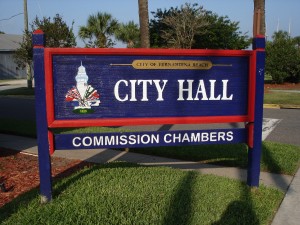Submitted by Suanne Z. Thamm
Reporter – News Analyst
February 26, 2018 6:20 a.m.
 Over the years there is probably no section of the Charter of the City of Fernandina Beach that has been the subject of scrutiny, interpretation and misinterpretation more than Section 10, which lays out in general terms the powers and limitations of the City Commission. The difficulties involving interpretation of this section played out in public at the February 20, 2018 Regular Meeting of the Fernandina Beach City Commission (FBCC), when Commissioner Roy Smith criticized Commissioner Chip Ross for attending a meeting to discuss outstanding issues and questions regarding the Alachua crossing.
Over the years there is probably no section of the Charter of the City of Fernandina Beach that has been the subject of scrutiny, interpretation and misinterpretation more than Section 10, which lays out in general terms the powers and limitations of the City Commission. The difficulties involving interpretation of this section played out in public at the February 20, 2018 Regular Meeting of the Fernandina Beach City Commission (FBCC), when Commissioner Roy Smith criticized Commissioner Chip Ross for attending a meeting to discuss outstanding issues and questions regarding the Alachua crossing.
Smith claimed that Ross had not been directed by the FBCC to represent them at that meeting and went on to claim that Ross was interfering with the work of the City Manager. Ross stated that he had given no direction to anyone during the meeting and that his role had been that of fact finder.
So what exactly does the Charter say about the separation of duties between the elected Commissioners, who have the responsibility to legislate on behalf of the citizens (making laws that set policy) and the appointed City Manager who as the city’s CEO must run the city and see that the laws and policies enacted by the FBCC are implemented.
Section 10.b. of the Charter gives commissioners broad powers:
All powers of the City, except as otherwise provided by this Charter or by the constitution of this state, are hereby vested in the City Commission. Except as otherwise provided by this Charter or by the constitution of this state, the City Commission may by ordinance or resolution prescribe the manner in which any power of the city may be exercised.
Section 10.c. (quoted below in part) modifies that broad power:
The Mayor and Commissioners shall deal with administrative service through the respective Charter Officer. The Mayor and Commissioners shall not directly interfere with or direct the conduct of any employee in the discharge of prescribed duties.
And to indicate how seriously that separation of powers must be observed, the writers of the Charter added Section 10.d.:
Any violation of the provisions of this section by any member of the City Commission shall, upon first offense be grounds for sanction by the Commission, and any second or subsequent offense or violation within a commissioner’s term shall constitute a misdemeanor and, upon conviction thereof before any court of competent jurisdiction the violator shall be fined in an amount not exceeding two hundred dollars ($200.00), or be imprisoned for a period not exceeding six (6) months, or both, at the discretion of the court, and shall be subject to removal from office.
The Charter lays out five powers for commissioners, only three of which are listed above.
Section 29 of the Charter addresses the City Manager’s powers. In stating that s/he is responsible to the City Commission “for the proper administration of all affairs of the city,” the Charter lists 9 specific duties, including:
(c)To exercise control and direct supervision over all departments and divisions of the municipal government under this Charter, or which may hereafter be created by the city commission …
and (f) To recommend to the commission for adoption such measures as he may deem necessary or expedient in the interests of the city.
Previous City Charter Review Committees have struggled to make the language separating the duties of the executive and the legislative branches of the city less ambiguous. But confusion still exists.
Perhaps City Attorney Tammi Bach will be able to calm the waters between Commissioners Smith and Ross on the Alachua Rail Crossing by privately discussing whether or not it was appropriate for Ross to act as fact finder without authority formally vested by the Commission.
And perhaps another Charter Review Committee will be able to clarify the troublesome Section 10 to minimize future misunderstandings.
The City Charter is available in its entirety on Municode along with a Code of Ordinances current as of October 17, 2017. The last Charter Review Report was issued in 2007. It was discussed extensively during a City Commission workshop on December 15, 2007.
 Editor’s Note: Suanne Z. Thamm is a native of Chautauqua County, NY, who moved to Fernandina Beach from Alexandria,VA, in 1994. As a long time city resident and city watcher, she provides interesting insight into the many issues that impact our city. We are grateful for Suanne’s many contributions to the Fernandina Observer.
Editor’s Note: Suanne Z. Thamm is a native of Chautauqua County, NY, who moved to Fernandina Beach from Alexandria,VA, in 1994. As a long time city resident and city watcher, she provides interesting insight into the many issues that impact our city. We are grateful for Suanne’s many contributions to the Fernandina Observer.
